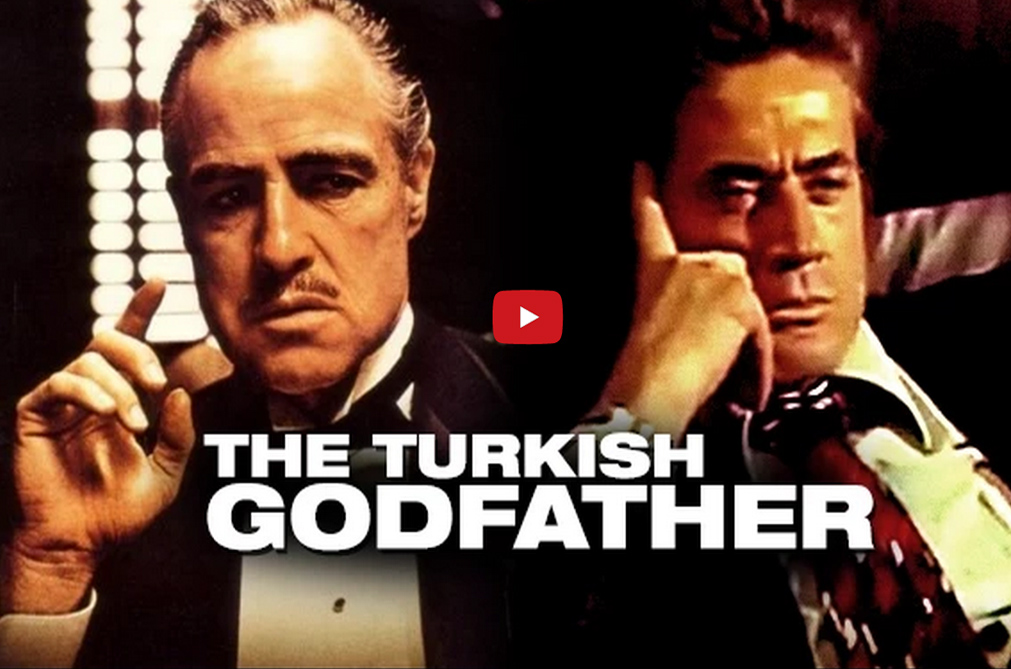Neon Harbor’dan Yeşilçam üzerine yeni bir Deja View videosu!
Hazırladığı videolarla sinemamız üzerine ingilizce içeriğe destek veren Ed Glaser, katkısını sürdürüyor. Bundan 1 ay kadar önce yazarlarımız Gökay Gelgeç ve Utku Uluer ile Kılıç Bey filmi ve Godfather teması üzerine bir sohbet yapan Ed Glaser’a Nina Rota’nın bu unutulmaz film temasının kaç Türk filminde kullanıldığı konusunda net bir cevap verememiştik. O sohbetimizin gelişmiş hali bir videoya dönüşmüş. Yeni videosunda bizlere de teşekkür eden Ed’e hazırldığı video için de biz teşekkür ediyoruz.
Aşağıda hem videoyu izleyebilir hem de transcriptini okuyabilirsiniz. Ayrıca Gökay Gelgeç’in yıllar önce hazırladığı Kılıç Bey videosuda yazının sonunda!
Transcript:
He’s rich. He’s connected. He’s the patriarch of a powerful family. He’s also an athletic, head-punching, virile heart-throb.
Turkey’s version of “The Godfather” is way more awesome.
You’re about to get a famiglia feeling of Deja View.
In 1978’s “Kılıç Bey,” Mr. Kılıç is a respected businessman by day and vigilante also by day. He helps the underprivileged using his influence, intimidation, and sometimes his fists to punish Istanbul’s corrupt and predatory tycoons. And in his spare time he runs an orphanage for small children.
It’s a description that hardly evokes Brando’s elderly, bulldoggish mobster or Francis Ford Coppola’s bloody period piece. And yet…
Desperate people who can’t get help from the police come to Kılıç begging for justice. A crime ring invites Kılıç into a new drug venture, which he refuses. The gang then tries and fails to assassinate him. Hospitalized, he dodges another round of assassins. A wife-beating brother-in-law tries to scheme his way into the family business. And did I mention the music?
It’s totally “The Godfather.” Just, without the mafia.
It turns out there are some very good reasons for that. For one, mafiosi wouldn’t have had an easy time as movie heroes. Turkey’s conservative censors took issue with films that glorified criminals. Those that did make it through tended to have one relatively standard ending…
Inspector: You are surrounded.
Kilink: True, you got me this time, Inspector. I will never again hinder the Turkish police.
Inspector: The Turkish police are the most capable in the world.
The 1970s were also a politically violent time in Turkey’s history. The country was in the midst of an economic crisis. Oil was scarce. Import restrictions led to rampant smuggling. Labor unrest and violence in the streets were familiar scenes. These issues are not lost on “Kılıç Bey,” which swaps out “The Godfather’s” organized crime for more relevant corporate crime. Its gangsters are rich business owners who cheat the system by fixing prices, dodging import taxes, and swindling the poor.
“Kılıç Bey” is also a prime example of a new genre born of those same social issues: the “men’s film.” Not merely action movies, men’s films specifically featured strong father figures who come out punching and shooting and punching some more until all of society’s problems are solved. These are men with no faith in the law and who act alone as judge, jury, and executioner.
And if you were casting a men’s film, you wanted your hero to be Cüneyt Arkın. Arkın was the man’s man — Turkey’s action superstar. He learned stunt riding from a Russian circus, trained in acrobatics, and earned a black belt in karate. These skills, combined with a natural charisma and screen presence, made him a winning combination of John Wayne, Errol Flynn, and Clint Eastwood. His career has spanned five decades and hundreds of films. And like Brando in his portrayal of Don Vito, Arkın’s talent and larger-than-life persona made him a perfect choice for the role of Mr. Kılıç.
Director Natuk Baytan was also a natural for the project. No stranger to social issues films, he was the filmmaker behind the extremely political “Straw Dogs” remake “Kartal Yuvası.” He would have no problem radically changing the original material to be precisely what he wanted it to be.
While a sizable chunk of “The Godfather’s” framework remains intact within “Kılıç Bey,” an enormous amount of material had to be condensed, streamlined, or dropped to fit a three-hour epic into just 70 minutes. The wedding party and the entire third act are completely eliminated. Characters like Johnny Fontaine and Kay Adams are also gone.
Other characters are combined. The Don Vito and Michael roles are merged giving Kılıç the wisdom of one and energy of the other. “The Godfather’s” Sollozzo and the rival crime families are all folded into “Kılıç Bey’s” primary baddie Djemal, giving Kılıç a single focal point for his war on injustice.
Surprisingly, one small detail is added back. Early in the film Kılıç visits a dying friend who, in his last hours, has one final request. It’s a sequence that strikingly mirrors a scene originally cut from “The Godfather” where Don Vito visits the deathbed of his old consigliere.
In “Kılıç Bey,” the friend’s final request is for Kılıç to take care of his orphan daughter, Djennet, who in part stands in for Michael Corleone’s Sicilian bride Appollonia. The new responsibility feeds into Kılıç’s struggle between staying in the big city to wage his solitary war for the common man, and returning to a simpler life in the country with his aging mother and love-struck ward.
“Kılıç Bey” is an intriguing example of how much a story can change and still be the same. It completely and effectively repurposes the tale of a twisted American dream for a turbulent, modern Turkey. Yet in spite of its new threads and new digs, somehow it still remains that same worldly Sicilian don.
“The Godfather” itself didn’t make much of an impact in Turkey, but its soundtrack was a different matter. Nino Rota’s iconic musical score was lifted and used in dozens of Turkish movies — everything from crime thrillers to melodramas to comedies.
That’s an impressive record.
Thanks so much for watching, and I’ll see you next time.














